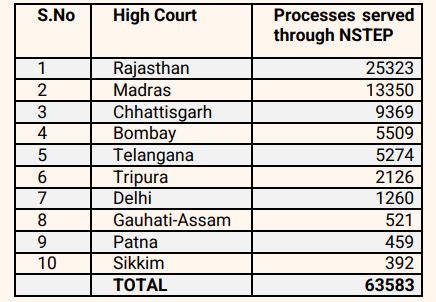The e-Committee of the Supreme Court has been awarded the Platinum Award for Excellence in Digital Governance for 2020 by President Ram Nath Kovind for its citizen-centric services and a host of digital reforms that ensured the continued fundamental right to access justice to life, especially during the Covid-19 pandemic.
The e-Committee’s January 2021 newsletter out Friday said during the Covid-19 pandemic, 55,417,58 cases were heard by courts through video conferencing. A payment of Rs 250 crore has been made online as fines through virtual courts. Citizens can access case status, cause list, court orders anywhere and at any time through the e-Courts website, mobile app, SMS, and email services. Citizens, litigants, and lawyers can get details of 13.79 Crore cases and 13.12 Crore orders and judgments online 24X7 free of cost.
The e-Committee digitized the delivery of processes through the National Service and Tracking of Electronic Process (NSTEP). The e-Committee has also taken up the mettle of making judicial processes, including digital services, accessible to persons with disabilities by taking steps to make the court websites accessible, initiating e-Filing for filing cases online, and making orders and judgments available in accessible formats for persons with visual impairments.
Accessible Audio Captcha Made Available on all High Court Websites
The Chairperson of the e-Committee, Justice Dr D.Y. Chandrachud, had issued guidelines to the Chief Justices of High Courts in a letter issued in December 2020 to take urgent action to make courts accessible, including the digital ecosystem, to persons with disabilities.
63,583 Summons served through NSTEP
National Service and Tracking of Electronic Summons (NSTEP) which is a game-changer application to curb the delay in service of summons is being implemented in 10 states as of January 2021. Nearly 63,583 summons have been served through NSTEP.
The High Court of Punjab & Haryana has successfully integrated the land revenue records with the Case Information System (CIS) software. After logging into CIS, one can get the Revenue Land Module Menu. Under this, one can retrieve the case using CNR/Filing/Case No. One can also enter the revenue details through the CNR number. It also provides date-wise/district-wise revenue records.
As part of Interoperable Criminal Justice ( ICJS), at Sheohar, Bihar, the Crime and Criminal Tracking Networking System (CCTNS) have been initiated, and now, the FIRs from three Police Stations, namely Tariyani, Piprahi, and Shyampur Bhataha, are sent in digital format to the court.
Read Also: Kerala HC dismisses PIL challenging draft Lakshadweep rules as premature
The Rajasthan High Court has developed a computer program that became operational from January 2021 to automatically send copies of judgment/orders through system-generated e-mail to the concerned court for compliance.
The High Court of Madras had implemented the e-Stamp facility for procurement of court fees through the Central Record Keeping Agency, M/s Stock Holding in the Principal Seat, and Madurai Bench of Madras High Court.
On January 20, 2021, the High Court of Kerala rolled out the e-filing platform developed by NIC in all commercial courts. Initially, with effect from 16 June 2020, e-Filing was launched in the State of Kerala at two Subordinate Courts, namely Munsif – Magistrate Court, Kolerichery, and the Rent Control Court, Ernakulam.



